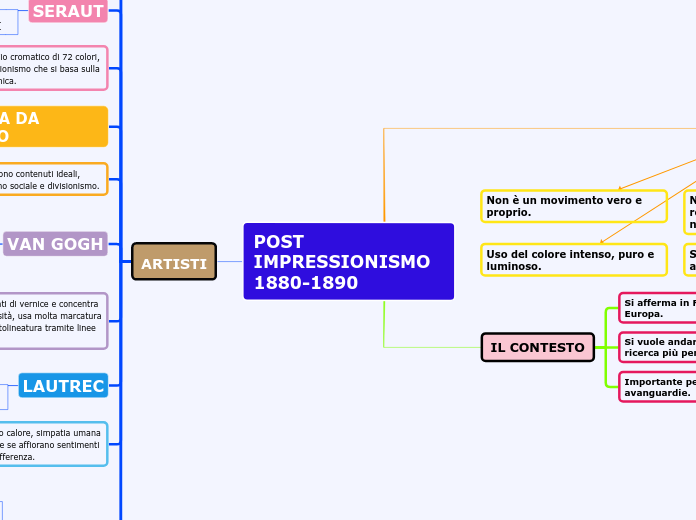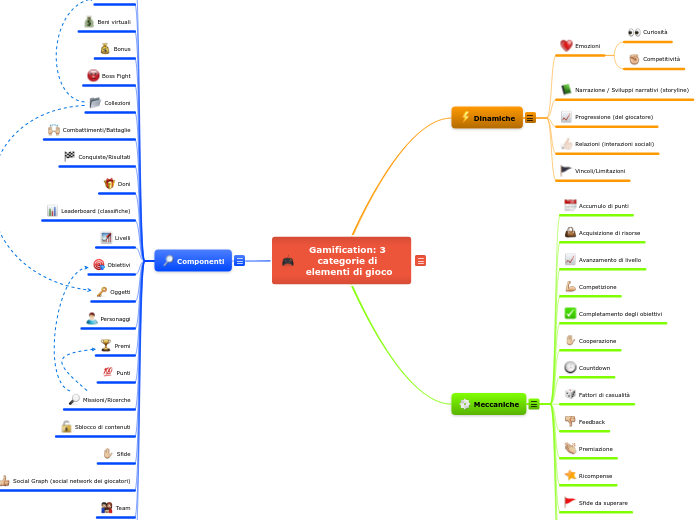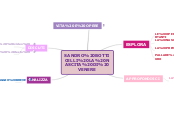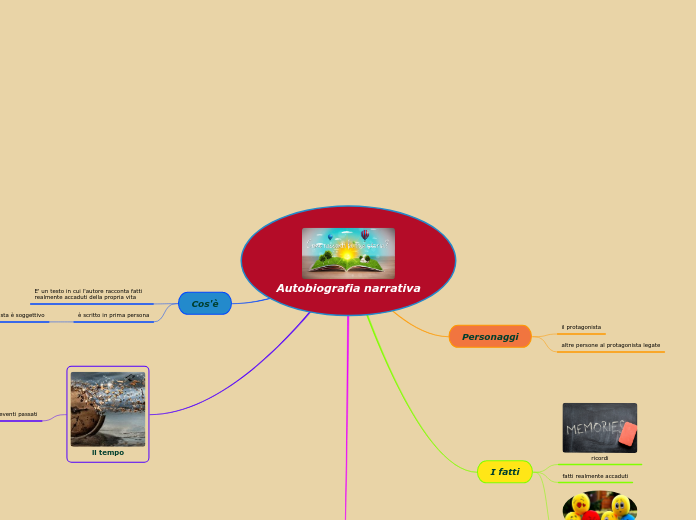POST IMPRESSIONISMO 1880-1890
In linguistics, syntax is the set of rules, principles, and processes that govern the structure of sentences in a given language, usually including word order.
ARTISTI
A complex sentence is a sentence that contains an independent clause and one or more dependent clauses.
An independent clause can stand alone as a sentence, but a dependent clause even though it has a subject and a verb cannot stand alone.
E' affascinato dai paesaggi con figura e poi dalle figure stesse, l'autore si muove verso luoghi incontaminati sotto il profilo culturale.
GAUGUIN
Attributive clauses serve as an attribute to a noun (pronoun) in the main clause. This noun or pronoun is called the antecedent of the clause.
DA DOVE VENIAMO? CHI SIAMO? DOVE SIAMO?
AHA OE FELI?
IL CRISTO GIALLO
L'ONDA
I quadri esprimono calore, simpatia umana e umorismo, anche se affiorano sentimenti di malinconia e sofferenza.
LAUTREC
An adverbial clause is a group of two or more words that function as an adverb in a sentence.
AL MOULIN ROUGE
Utilizza spessi strati di vernice e concentra tutto sulla luminosità, usa molta marcatura cromatica e la sottolineatura tramite linee di contorno.
VAN GOGH
An appositive clause follows another noun or noun phrase in apposition to it; that is, it provides information that further identifies or defines it.
AUTORITRATTI
NOTTE STELLATA
Opere che esprimono contenuti ideali, fusione tra realismo sociale e divisionismo.
PELLIZZA DA VOLPEDO
The subject clause is a dependent clause that acts as a subject.
QUARTO GRADO
Progetto del cerchio cromatico di 72 colori, iniziatore del divisionismo che si basa sulla composizione retinica.
SERAUT
A predicative clause may be introduced by conjunctions - that, whether, whether... or, as, as if, as though, because, lest, the way - or connectives.
The latter may be conjunctive pronouns - who, whoever, what, whatever, which - or conjunctive adverbs - where, wherever, when, whenever, how, why.
UNA DIMANCHE APRES-MIDI
OPERA:
Dipinge "en plain air", cerca di rappresentare la verità essenziale delle cose, utilizza volumi come schema di base delle sue opere.
CEZANNE
The object clause is a phrase on which a verb performs an action. It falls at the end of a sentence, and is governed by a verb or a preposition.
LA MONTAGNA DI SAINTE VICTORIE
I BAGNANTI
OPERE:
Sottoargomento
IL CONTESTO
Importante per la nascita delle avanguardie.
See the example below and try to create your own simple sentences.
Tim is driving the car with his mother.
Si vuole andare oltre in una ricerca più personale.
See the example below and try to create your own simple sentences.
Tim is the driver.
Si afferma in Francia e poi in tutta Europa.
See the example below and try to create your own simple sentences.
Tim drives the car.
CARATTERISTICHE
Concetto di pittura che possa esprimere i valori interiori.
An adverbial is an individual word (that is, an adverb), a phrase, or a clause that can modify a verb, an adjective, or a complete sentence.
Superamento convenzioni artistiche.
The attribute is defined as a quality or characteristic of a person, place or thing.
Uso del colore intenso, puro e luminoso.
The predicative is defined as an adjective or noun forming or contained in the predicate.
Its main trait is that it serves to express a property that is assigned to a 'subject'.
For e.g.: The dog is old.
Rappresentare l'impressione di un attimo.
Traditional grammar defines the object in a sentence as the entity that is acted upon by the subject.
Necessità di rispettare la realtà e essere fedeli alla natura.
The predicate of a sentence is the part that modifies the subject in some way. Because the subject is the person, place, or thing that a sentence is about, the predicate must contain a verb explaining what the subject does and can also include a modifier.
Non è un movimento vero e proprio.
The subject of a sentence is the person, place, thing, or idea that is doing or being something. You can find the subject of a sentence if you can find the verb.
Ask the question, 'Who or what 'verbs' or 'verbed'?' and the answer to that question is the subject.









